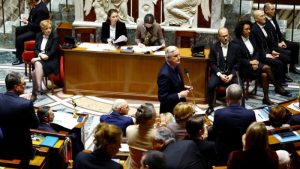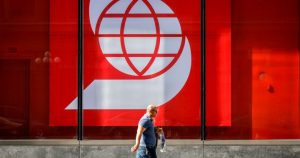The centre holds in Ireland
This article is an on-site version of our Europe Express newsletter. Sign up here to get the newsletter sent straight to your inbox every weekday and Saturday morning. Explore all of our newsletters here
Welcome back. Ireland’s next general election is due by March, but few will be surprised if Simon Harris, the Taoiseach, chooses to go early and holds the poll in November. For Ireland’s friends and partners abroad, this raises three interesting questions.
To what extent will Ireland buck recent European trends and reject anti-establishment populism and political radicalism?
Will the election spell triumph or disaster for Sinn Féin, the opposition party that until recently was riding high in opinion polls?
And what are the implications for Sinn Féin’s ambition of unifying the Republic with Northern Ireland?
You can find me at [email protected].
The (partial) Irish exception
Answers to the first two questions require an understanding that, although Irish politics follows continental European patterns in many respects, it is distinctive in its own right.
The backdrop is similar in that immigration, asylum policy and the crucial issue of housing shortages are nowadays at the front of voters’ minds, as Fiachra Ó Cionnaith wrote in July for RTÉ News.
This is hardly surprising: according to Ireland’s statistics office, the number of immigrants — a category that includes Ukrainian refugees — had risen by April to a 17-year high.
Yet whereas in France, Germany and other western European countries such trends have pushed up support for hard-right parties, Ireland is different.
Writing in December after anti-immigrant riots rocked Dublin, Niklaus Nuspliger of the Neue Zürcher Zeitung observed:
Partly due to the long experience of emigration, solidarity and sympathy for foreigners traditionally prevail in the country, and there has never been a successful rightwing populist movement.
Still, in a survey published in December, 28 per cent of respondents said that they could imagine voting for a party with strongly anti-immigration positions — twice as many as in 2021.

Some far-right activists aim to whip up support by adopting the symbols and slogans of the Irish nationalist struggle against British rule in the age of imperialism. However, they remain on the wilder extremes of electoral politics.
Sinn Féin on the back foot
As a leftwing nationalist party with support among young people who have liberal views on immigration, Sinn Féin was slow to appreciate that it was losing touch with other voters on this issue. Jude Webber, the FT’s Dublin correspondent, wrote in March:
Some of Sinn Féin’s core working-class voter base has leached to small independent parties in recent months, including fringe groups opposed to immigration.
Partly as a consequence, the party had a disappointing result in June’s local elections. Now, as the chart below shows, support for Sinn Féin has slumped by half to about 19 per cent from roughly 36 per cent in July 2022.
It seems likely that, in contrast to some EU countries, the upcoming election will not send Ireland down the road of political polarisation and a legislature so fragmented that it’s hard to form a government (France is the prime example).
Rather, as for most of the past century, the reins of government will stay in the hands of Fianna Fáil and/or Fine Gael, Ireland’s largest mainstream parties. At present, they govern in a three-party coalition with the smaller Green party.
Even so, Sinn Féin remains a force to reckon with. For most of the post-second world war era, it was a minor party in electoral terms — abhorred by the mainstream parties as the mouthpiece of the IRA, which was fighting to end British rule in Northern Ireland.
Sinn Féin’s breakthrough came in the 2011 election at the height of Ireland’s involvement in the Eurozone sovereign debt and banking crises. In the last election in 2020, Sinn Féin emerged as the second largest party in the legislature.
Northern Ireland and unification
Moreover, Sinn Féin is consolidating its position as the largest party in Northern Ireland. Coupled with the destabilising effects of Brexit on politics in the province, this may seem to bring closer the prospect of Irish unification.
In practice, I don’t think this is likely in the near term. For one thing, Ireland’s next government will almost certainly not include Sinn Féin.
For another, recent polling suggests that more voters in Northern Ireland would choose to remain part of the UK than to merge the province with the Republic.
In the longer term, predictions are hazardous. The same polling indicates that a united Ireland is most popular with voters in the province aged under 45. Moreover, since Brexit, tens of thousands of people in Northern Ireland have been acquiring Irish passports.
Irish stallion outpaces EU donkeys
How will the state of Ireland’s economy affect the impending election?
At first sight, Ireland appears to be in the pink of health compared with other EU countries. This could work to the advantage of Fianna Fáil and Fine Gael.
A gathering mood of gloom about Europe’s economic prospects was reinforced this month in Mario Draghi’s clarion call for rapid, far-reaching reforms, including annual investments of €800bn in a new industrial strategy. “Do this, or it’s a slow agony,” he told reporters.
There’s particular concern about Germany, as outlined in this commentary for the Omfif think-tank by Miroslav Singer, a former Czech central bank governor.
Germany’s economic issues are not only tied to the exhaustion of its economic model but also to the fact that the European Union’s largest economic project of the past 25 years — the euro — has fallen short of expectations.
In Ireland, matters seem to stand differently.
The economy is growing nicely, inflation is under control, there’s nearly full employment and the government is amassing large budget surpluses (in sharp contrast to, say, France or Italy).
These surpluses are prompting Ireland to set up two sovereign wealth funds to protect public services for the long term, modernise infrastructure and handle climate change. It’s almost as if Ireland is more like energy-rich Norway than most of its EU partners.
Money, money everywhere
Ireland owes its enviable fiscal position largely to high corporation tax receipts, as shown in the chart below.

Especially noteworthy is the €13bn windfall in back taxes due from Apple after a European Court of Justice ruling. It’s an extraordinary sum for a country of just over 5.3mn people.
The Irish government, keen to preserve its special tax arrangements for the US tech giant and other multinational companies, spent millions of euros in legal fees to avoid receiving this money. But in the end, life is life, isn’t it? Sometimes billions just drop into your bank account whether you like it or not.
All this shows how far Ireland appears to have progressed since the dark days of 2010 when it became the second country, after Greece, to require an EU-IMF emergency bailout (with some extra funds thrown in by the UK) amid the Eurozone crisis.
At that time, the Irish Times published an editorial that referred to the 1916 Easter Uprising against British rule, celebrated as a defining moment in the independence struggle. The newspaper asked if this was “what the men of 1916 died for: a bailout from the German chancellor with a few shillings of sympathy from the British chancellor on the side”.
Not all sweetness and light
Despite appearances, not all is perfect in the Irish economy. Scope Ratings, a credit-rating agency, says:
The Irish economy remains highly dependent on a small number of large [multinationals] . . . just three firms contribute around 43 per cent of corporation tax . . . as a small and very globalised economy, Ireland is particularly vulnerable to adverse shifts in the external environment.
Then there’s the question of how to allocate the budget surpluses. Tom McDonnell, co-director of Ireland’s Nevin Economic Research Institute, cautions:
Ireland’s bleak history of procyclical budgets and their consequences should warn us against making similar mistakes this time.
As with immigration, the economy will provide much for Ireland’s next government to think about. But perhaps Ireland’s leaders will prove WB Yeats to have been too pessimistic — the centre really can hold.
Paramilitary criminal gangs in Northern Ireland — a report by Una Kelly for RTÉ News
Tony’s picks of the week
-
Israeli spies have a long history of using telephones, and their technological successors, to track and even assassinate their enemies, the FT’s Mehul Srivastava reports
-
Russian citizens who permanently reside in Latvia but have failed the required Latvian-language exam have started receiving letters warning them to leave within 30 days or face “forced deportation”, Marija Andrejeva writes for Radio Free Europe/Radio Liberty
Recommended newsletters for you
FT Opinion — Insights and judgments from top commentators. Sign up here
Chris Giles on Central Banks — Vital news and views on what central banks are thinking, inflation, interest rates and money. Sign up here
#centre #holds #Ireland








